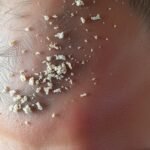Many people wonder if lemon juice can help with dandruff. About 50% of the world’s population deals with dandruff at some time. Lemon juice is seen as a possible solution because of its ability to fight off harmful microbes and fungi.
Using lemon juice for dandruff might seem odd, but it can help. Its acidity can balance the scalp’s pH, making it harder for fungi to grow. Mixing lemon juice with coconut oil can be a cheap and effective hair treatment. Plus, lemon juice is full of vitamin C, which is good for hair strength.
Before we dive into lemon juice’s benefits for dandruff, let’s understand what causes dandruff. We’ll also look at how lemon juice can help. This article will cover the science behind lemon juice’s effects on dandruff and hair care.
Key Takeaways
- Approximately 50% of the global population experiences dandruff at some point in their lives.
- Lemon juice has anti-microbial, anti-bacterial, and anti-fungal properties, making it potentially effective in reducing the growth of dandruff-causing fungi.
- Lemon juice can help balance the scalp pH levels, which tends to become alkaline due to shampoos, dry hair, or environmental stressors.
- Using lemon juice for dandruff treatment can be a cost-effective and natural solution.
- Combining lemon juice with coconut oil or olive oil can alleviate the drying effects caused by lemon’s acidity.
- Regular use of lemon juice treatments can be applied 2 to 3 times a week for effective dandruff management.
Understanding How Lemon Juice Affects Your Scalp
When looking for natural dandruff remedies, knowing what you use is key. Lemon juice is popular for its benefits in hair care. It’s packed with citric acid, vitamin C, and antimicrobial properties.
The citric acid in lemon juice can balance your scalp’s pH. This is important for a healthy scalp. It also fights fungal infections that cause dandruff.
The Natural Properties of Lemon Juice
Lemon juice is full of vitamin C, which controls sebum. Using lemon juice in your hair care can improve scalp health. It can also reduce dandruff symptoms.
How Citric Acid Impacts Scalp Health
Citric acid keeps your scalp balanced. Using lemon juice can lessen oiliness and flakiness. It also fights fungal infections that cause dandruff.
The Role of Antimicrobial Properties
Lemon juice’s antimicrobial properties fight fungal infections that lead to dandruff. Adding lemon juice to your hair care can reduce dandruff. It’s a natural way to keep your scalp healthy.
Does Lemon Juice Help with Dandruff: The Scientific Evidence

Looking into lemon juice for scalp health, we need to check the science. There’s not much research, but some studies hint at its benefits. A 2015 study found that lemon’s citric acid helps keep the scalp’s pH balanced, which is key.
This balance is important for fighting dandruff. For more on lemon juice’s hair benefits, check out this website. Also, lemon’s citric acid can soak up extra oils, which helps with seborrheic dermatitis.
Using lemon juice on your scalp can offer several advantages:
- It reduces inflammation and irritation.
- It keeps the scalp’s pH balanced.
- It absorbs extra oils.
But, we need more research to confirm lemon juice’s role in treating dandruff. Many people swear by it, though. If you’re thinking of trying lemon juice, consider the pros and cons. Make sure to use it safely to avoid any harm.
Benefits of Using Lemon Juice for Scalp Care

Using lemon juice for scalp care offers many benefits. It helps regulate pH balance and reduce inflammation. Lemon juice is packed with vitamin C, which is vital for scalp health and fighting dandruff. A study found that lemon juice’s vitamins and antioxidants can lessen dandruff symptoms.
Some key benefits of using lemon juice for scalp care include:
- Regulating pH balance: Citric acid in lemon juice keeps the scalp’s pH balanced, making it harder for fungi to grow.
- Natural exfoliation: Lemon juice’s citric acid gently removes dead skin cells, reducing dandruff flakiness.
- Reducing inflammation: Lemon juice’s anti-inflammatory properties can lessen redness and itching from dandruff.
To make a lemon juice dandruff treatment work, use it with other natural ingredients like coconut oil. Coconut oil and lemon juice together can cut down on sebum and moisturize. You can also use lemon juice as a pre-shampoo treatment or hair mask to tackle itchy scalp problems. Regularly using lemon scrubs can clear out oil, dirt, and dandruff flakes.
How to Apply Lemon Juice to Your Hair
There are many ways to use lemon juice for hair care. You can try a DIY lemon juice hair treatment. This can be applied directly to your hair or mixed with other ingredients for extra benefits.
One effective method is mixing lemon juice with coconut oil. This helps reduce too much oil and fungal growth. You can also mix lemon juice with water as a final rinse. This helps cut down on excess oil and dandruff.
Another option is mixing lemon juice with amla juice. This helps reduce dead cells on your scalp. Or, you can mix it with an egg to make a natural conditioner. This helps reduce dead skin build-up.
Here are some other DIY lemon juice hair treatments you can try:
- Mix 2 tablespoons of lemon juice with 1 cup of water as a final rinse to decrease excess oil and dandruff.
- Combine 2 tablespoons of lemon juice with 1 tablespoon of coconut oil to reduce excessive sebum production and fungal growth.
- Apply a mixture of 1 tablespoon of lemon juice and 1 egg as a natural conditioner and to reduce dead skin build-up.
Always dilute lemon juice with a carrier oil or water. Too much can make your hair dry or brittle. Regular use of a DIY lemon juice hair treatment can balance your scalp’s pH. It can also reduce dandruff and promote healthy hair growth.
Potential Side Effects and Precautions
Using lemon juice as a hair rinse comes with some important considerations. It can help with dandruff but might also cause skin sensitivity, sun exposure risks, and interactions with other hair products. Always dilute lemon juice with water to prevent scalp irritation, which can happen to some people.
A lemon juice hair rinse can be a great natural solution for dandruff. But, it’s important to use it carefully. Some may feel burning, stinging, or redness, which is more common in those with sensitive skin. To avoid these issues, start with a small test area and gradually increase use. Regular lemon juice application can greatly reduce dandruff, but remember to balance it with moisturizers to avoid dryness and brittleness.
Here are some key precautions to remember when treating dandruff with lemon juice:
- Avoid direct sun exposure after application to prevent skin irritation
- Don’t leave lemon juice in your hair for more than 15-20 minutes to avoid premature greying
- Use fresh lemon juice, as bottled juice may have preservatives that irritate the scalp
By understanding these possible side effects and taking the right precautions, you can safely use lemon juice as a hair rinse. It can help control dandruff and promote a healthy scalp and hair.
Conclusion: Is Lemon Juice Right for Your Dandruff Treatment?
Lemon juice might not cure dandruff on its own, but it’s a good natural remedy. The citric acid in lemon juice helps keep your scalp’s pH balanced. It also fights fungal growth and reduces oil, making your scalp healthier and less flaky.
Using lemon juice with other ingredients like coconut oil, honey, or yogurt can make homemade treatments more effective. These treatments target different aspects of dandruff. Regular use of lemon-based remedies and scalp exfoliation can help reduce dandruff symptoms and improve scalp health.
But, watch how your skin reacts to lemon juice. If it’s too harsh, dilute it. If you have any bad reactions, talk to a dermatologist. They can help you use lemon juice safely for your hair and scalp.








Interesting read, but isnt it possible that citric acid in lemon juice could actually dry out the scalp, worsening dandruff? Just a thought…
Interesting read, but isnt the citric acid in lemon too harsh for the scalp? Can it lead to dryness or hair loss?
Interesting read but ever considered how lemon juice may strip hair of its natural oils, leading to dryness? Food for thought…